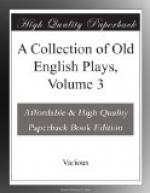Did.—Observe.
Bus.—Matters to make me mourne eternallye.
Gan. Your bountye speaks you, sir, a god on earthe, For you rewarde a service that’s so meane It scarce speaks dutye (for you are my emperoure)—
Charl. Tys thou hast made me greater then
my name ... ... ... ... ...
How mysserablye so ere our nature maks
Us thynke a happynes, was a greate burthen,
But nowe tys all the heaven I wishe to knowe;
For Tyme (whose ende like hys originall
Is most inscrutable) hathe nowe payde backe
The sapp of fortie winters to theise veanes,
Which he had borrowed to mayntayne hys course
From these late dead now manlye facultyes.
Kysse me, Theodora. Gods, carouse your
fyll,
I envye not your nectar; from thys lypp
Puerer Nepenthe flowes. Some tryumphes, lords!
I challendge all of you at Barryers.
Bus. Alas, good man! A gawntletts wayght will presse him into cynders.
Char. I am so rapt with pleasure and delighte
I scarce thynke I am mortall; all the Joys,
Wherewith heavens goodnes can inryche a man,
Not onlye greete but dwell upon my sence,
And whyles I see thee cannot stray from thence,
Most excellent Theodora.
The. Tys onlye your acceptance maks me
so;
For Butye’s like a stone of unknowne worthe,
The estymatyon maks it pretyous;
For which the Jemes beholden to the owner.
Char. Did you ere heare a voyce more musycall?
The Thracian Orpheus, whose admyred skyll
Is sayd to have had power ore ravenous beasts
To make theym lay their naturall feircenes by
When he but toucht his harpe; that on the floods
Had power above theire regent (the pale Moone)
To make them tourne or stay their violent course
When he was pleasd to ravishe theym with sounds,
Neare had abyllitie with all his arte
To matche the naturall musyque of thy voyce.
And were I on the axeltree of heaven
To note the Zodiaks anuall chaunge and course,
The Sunns bryghte progresse and the planetts motyons,
To play with Luna or newe lampe the starres,
To note Orion or the Pleiades,
Or with the sunne guyld the Antipodes,—
Yet all the glorye, in exchaunge for thee,
Would be my torment and heavens crueltye.
Bus. Was ere man thus orejoyd with mans own curse!
Enter Reinaldo.
Char. Thou only arte happynes.
Rei. Not, greate Lord, for I Bringe newes that doth include—
Char. Cossan, your blame,
And tys a dylligence of too muche pryde
That interrupts myne admyratyon.
Rei. My newse when knowne will raze out
that beleife
And be as wellcome as a gentyll callme
To a longe daungerd seaman in a storme,
Suche as up on Aeneas straglinge fleete
At Juno’s will by Aeolus was raysd
When in his flyght from horror he sawe more
Then Troy affoarded; for the newese I brynge
Is vyctorie, which crownes the crownes of kynges.




